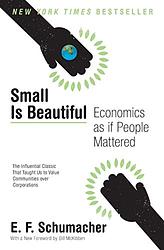Small Is Beautiful: Economics as if People Mattered by E. F. Schumacher
This book is a collection of essays that challenge the established economic paradigm, arguing for a shift towards smaller, more sustainable systems. The author criticizes conventional capitalism for its focus on profit and growth, suggesting instead that economies should prioritize human well-being and environmental health. He presents a vision of "Buddhist economics," where work is viewed as a means to personal development and fulfillment, not just income generation. The book also offers practical solutions for implementing this new economic model, such as decentralization, appropriate technologies, and renewable energy.
The 1227th greatest book of all time
Ranking Details:
Our ranking system awards points to books based on their appearance and position on curated lists. Here's how it works:
Unranked Lists: For lists without specific rankings, each book receives points equivalent to the list's weight. This approach recognizes the book's inclusion on prestigious lists.
Ranked Lists: Books on ranked lists receive points in two ways:
- Base Points: Initially, every book is awarded points equal to the list's weight, acknowledging its significance.
- Bonus Points: Additionally, books earn bonus points based on their ranking. The total bonus pool, equal to 100% of the list's weight, is distributed among the books, with higher-ranked books receiving more points.
Exponential Distribution: The distribution of bonus points follows an exponential model. This means the top-ranked book (#1) receives significantly more bonus points than those further down the list (e.g., #100). Our algorithm ensures that higher placements are rewarded more generously, reflecting the achievement of a top rank on any given list.
This scoring system ensures that each book's ranking reflects both its presence on multiple lists and its positions within those lists, providing a comprehensive measure of its acclaim and popularity.
Total Points: 306
Since this book was first published in 1973, there is a penalty of 0%. The age adjusted score is 306.0.
This is to prevent newer books from reaching super high on the ranked list of the greatest books of all time. The greatest books should also stand the test of time.
- score: 114 -- The Hundred Most Influential Books Since The War (WW2) (Weight: 114)
- score: 108 -- The New York Public Library's Books of the Century (Weight: 108)
- score: 84 -- Select 100 (Weight: 84)

